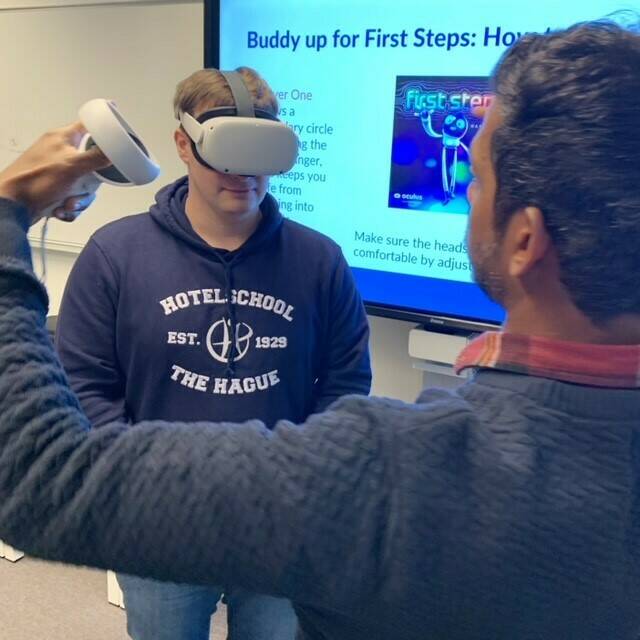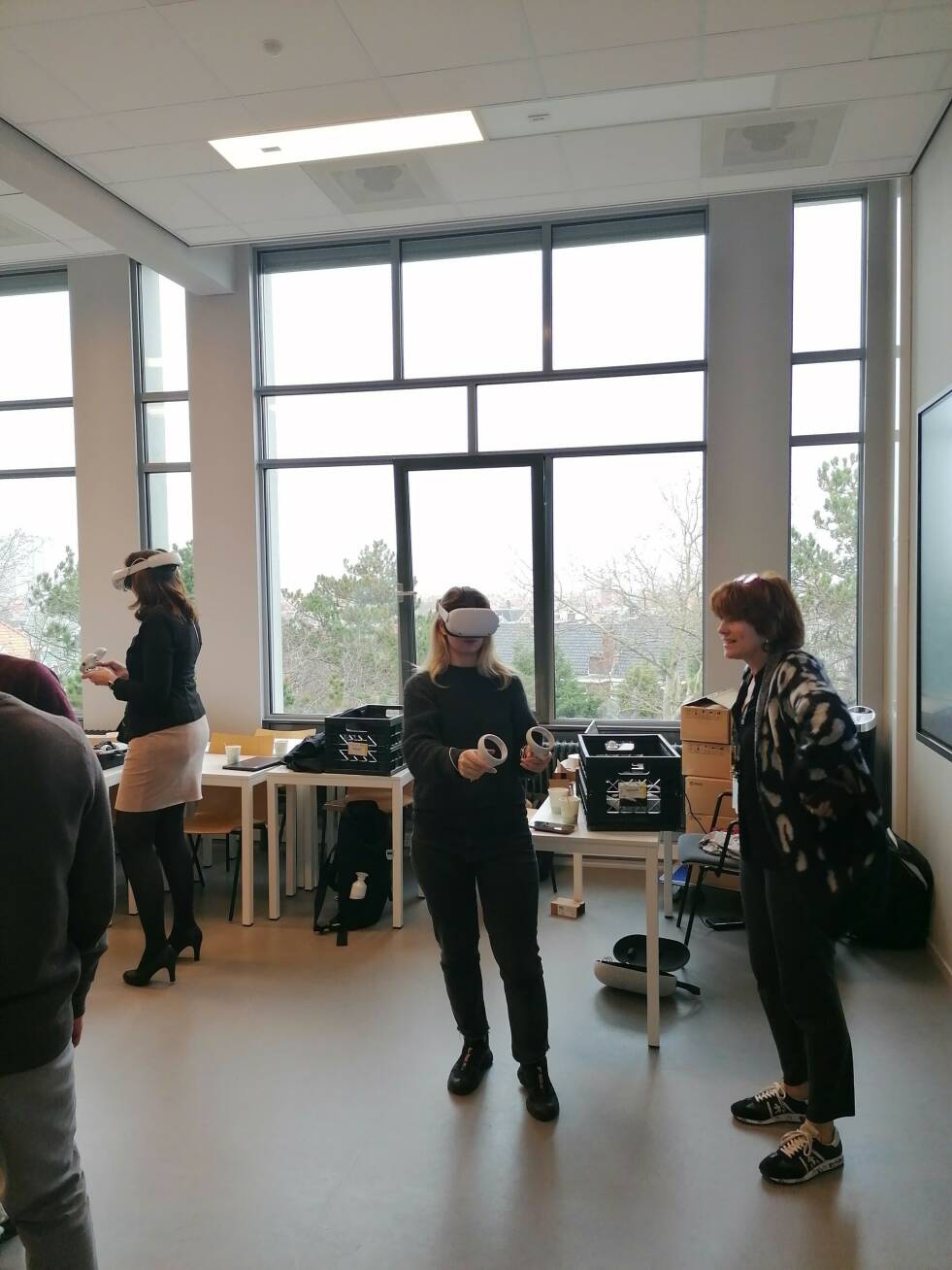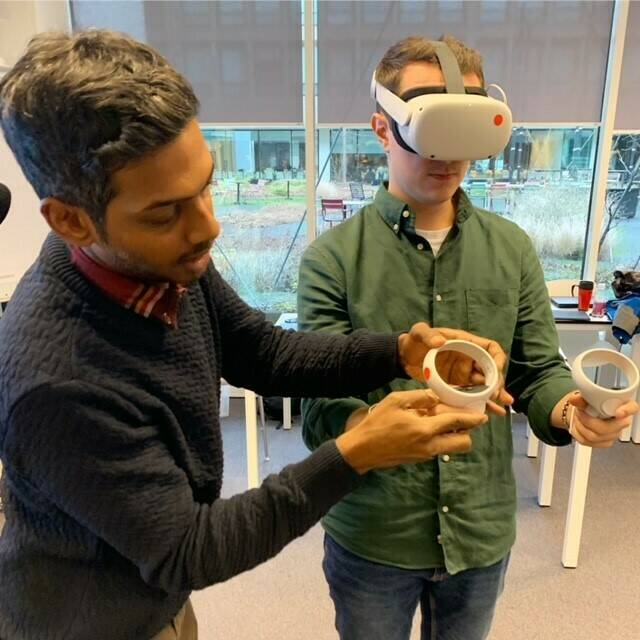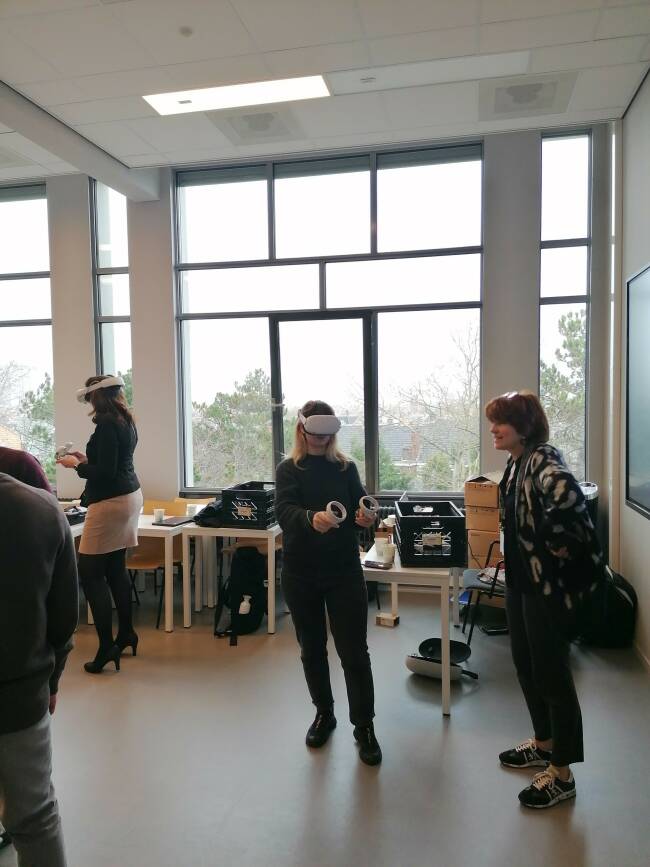Back to Contents

Read Standard

Special Feature: Small-Scale and Intensive Education
Implementing VR/AR in many courses has developed immersive learning experiences that involved a sense of Play, Personal and Real. Using these technologies allowed us to create more variety in virtual learning options and brought more flexibility and enrichment of digital learning. Students were able to practice skills and procedures needed in PE/MO outlets for work readiness.
Milestones Completed
During the time of uncertainty caused by the pandemic, education was facing enormous pressure and many challenges. We had to forge creative pathways to seek connection, support and resources in learning environments and continue to deliver quality in practical education.
VR/AR Implementation in the Curriculum
Courses where VR/AR have been used:
Minor Future of Work (8 experiences)
Minor Future of Digitalisation (1 experience)
Minor Future of Guest Experience (1 experience)
Minor Future of Food (2 experiences)
International Fast Track Programme – Assertiveness Skills (2 experiences)
Business Transformation Solutions (2 experiences)
Practical outlet – kitchen (2 experiences)
Making Change Happen (2 experiences)
LYCar commissioner
Pre-master (panel discussion)
Courses where VR/AR have been embedded:
Minor Future of Work
Business Transformation Solutions
Based on the students’ evaluation we can conclude that the implementation of VR was able to deliver a powerful emotional experience that could be connected to learning, retention and increased attention of students. Mobile AR’s ability encouraged interactivity and a social connection to an instructor/lecturer. See for content detail.

Minor Future of Work pilot: Unleash the potential of team members (WarpVR) Student:
“...during times of the pandemic (it is a) very interesting and a safe practice tool. Also, it makes you more comfortable, as you can practice having a difficult conversation with a person where you under real-life situation would maybe feel uncomfortable practicing it. So, basically, you have an experience with trial and error without a real human interaction where you can just try it again and again. That way you can overcome this fear and practice as much as you want.”
Minor Future of Work Student:
“If I compare this now to other learning experiences, I would say that this is the most realistic interaction I have had, that has kept my full attention. Normally, I am writing notes during a lesson but now I purely focused on the experience.”
Minor Future of Work Student:
“My hesitation went away the moment I started the VR scenario especially because it felt real. It felt as if I was sitting at the table with Sara.”
Minor Future of Work: Creating Immersive training experiences at The W (Matterport) Student:
“I found it an inspiring experience to actually make a VR/AR learning environment myself. I truly believe that this is the future of education and the future of the onboarding process in the hospitality industry where this is possible.”
The milestones that have been realised up to present:
Development of a VR/AR ecosystem of suppliers, experts and industry partners
Obtaining start-up VR/AR equipment
Obtained a set of 10 x Pico Neo 4 Pro Enterprise headsets
Collaborating with Haaga Helia UAS (Finland), University Balearic Islands and TU Dublin to develop VR/AR prototypes for Transformative Hospitality Education & Tech (THETA) Abilities project under Erasmus +
As part of the THETA project, formal training of seven HTH staff in Haaga Helia, Helsinki on how to develop AR/VR prototypes and integrate into their courses was held in November 2023.
Received positive feedback and interest from industry partners e.g. in Amsterdam on immersive prototypes for induction training (SOPs) developed by FoW students using Matterport.
Informal co-creation training with interested staff (media centre & lecturers) on developing VR experiences with 360 video for courses
First student research project (LYCar)commissioned on using VR/AR to enhance hospitality education
Skill-sharing on creating a 360°video with TU Dublin
Collaborative Online International Learning project with University of Johannesburg & Dusit Thani College (Thailand)
Currently we run the following projects with VR/AR implementation:
Spanish - language training during check-in
Entrepreneurship – medium for observing customer behaviours
Marketing Fundamentals – global customer experiences
LYCar research prototyping
Immersive MO outlets (real-life learning)

Future Aspirations
We have plans to expand the VR/AR experience for students and staff. Looking forward we intend to provide:

Back to top
Development and dissemination of manuals on how to develop VR/AR content to HTH staff
Continued collaboration with industry partners to developing immersive experiences to addressing training needs
Develop immersive practical outlets in the long term for real-life learning
Further integration in courses: for Year 1 Personal Leadership, HR & Culture Fundamentals and PE/MO.
AR/VR research line within the Research Centre to evaluate experiences in terms of learning effectiveness thereby allowing research to inform practice
Obtain a movable VR cabinet to transport headsets between campuses and classrooms or a second set of ten headsets for The Hague campus.
Back to Contents

Read Standard
During the time of uncertainty caused by the pandemic, education was facing enormous pressure and many challenges. We had to forge creative pathways to seek connection, support and resources in learning environments and continue to deliver quality in practical education.
Milestones Completed
Implementing VR/AR in many courses has developed immersive learning experiences that involved a sense of Play, Personal and Real. Using these technologies allowed us to create more variety in virtual learning options and brought more flexibility and enrichment of digital learning. Students were able to practice skills and procedures needed in PE/MO outlets for work readiness.
VR/AR Implementation in the Curriculum
Courses where VR/AR have been used:
Minor Future of Work (8 experiences)
Minor Future of Digitalisation (1 experience)
Minor Future of Guest Experience (1 experience)
Minor Future of Food (2 experiences)
International Fast Track Programme – Assertiveness Skills (2 experiences)
Business Transformation Solutions (2 experiences)
Practical outlet – kitchen (2 experiences)
Making Change Happen (2 experiences)
LYCar commissioner
Pre-master (panel discussion)
Courses where VR/AR have been embedded:
Minor Future of Work
Business Transformation Solutions
Based on the students’ evaluation we can conclude that the implementation of VR was able to deliver a powerful emotional experience that could be connected to learning, retention and increased attention of students. Mobile AR’s ability encouraged interactivity and a social connection to an instructor/lecturer. See for content detail.

Minor Future of Work pilot: Unleash the potential of team members (WarpVR) Student:
“...during times of the pandemic (it is a) very interesting and a safe practice tool. Also, it makes you more comfortable, as you can practice having a difficult conversation with a person where you under real-life situation would maybe feel uncomfortable practicing it. So, basically, you have an experience with trial and error without a real human interaction where you can just try it again and again. That way you can overcome this fear and practice as much as you want.”
Minor Future of Work Student:
“If I compare this now to other learning experiences, I would say that this is the most realistic interaction I have had, that has kept my full attention. Normally, I am writing notes during a lesson but now I purely focused on the experience.”
Minor Future of Work Student:
“My hesitation went away the moment I started the VR scenario especially because it felt real. It felt as if I was sitting at the table with Sara.”
Minor Future of Work: Creating Immersive training experiences at The W (Matterport) Student:
“I found it an inspiring experience to actually make a VR/AR learning environment myself. I truly believe that this is the future of education and the future of the onboarding process in the hospitality industry where this is possible.”

The milestones that have been realised up to present:
Development of a VR/AR ecosystem of suppliers, experts and industry partners
Obtaining start-up VR/AR equipment
Obtained a set of 10 x Pico Neo 4 Pro Enterprise headsets
Collaborating with Haaga Helia UAS (Finland), University Balearic Islands and TU Dublin to develop VR/AR prototypes for Transformative Hospitality Education & Tech (THETA) Abilities project under Erasmus +
As part of the THETA project, formal training of seven HTH staff in Haaga Helia, Helsinki on how to develop AR/VR prototypes and integrate into their courses was held in November 2023.
Received positive feedback and interest from industry partners e.g. in Amsterdam on immersive prototypes for induction training (SOPs) developed by FoW students using Matterport.
Informal co-creation training with interested staff (media centre & lecturers) on developing VR experiences with 360 video for courses
First student research project (LYCar)commissioned on using VR/AR to enhance hospitality education
Skill-sharing on creating a 360°video with TU Dublin
Collaborative Online International Learning project with University of Johannesburg & Dusit Thani College (Thailand)
Currently we run the following projects with VR/AR implementation:
Spanish - language training during check-in
Entrepreneurship – medium for observing customer behaviours
Marketing Fundamentals – global customer experiences
LYCar research prototyping
Immersive MO outlets (real-life learning)
We have plans to expand the VR/AR experience for students and staff. Looking forward we intend to provide:
Future Aspirations
Development and dissemination of manuals on how to develop VR/AR content to HTH staff
Continued collaboration with industry partners to developing immersive experiences to addressing training needs
Develop immersive practical outlets in the long term for real-life learning
Further integration in courses: for Year 1 Personal Leadership, HR & Culture Fundamentals and PE/MO.
AR/VR research line within the Research Centre to evaluate experiences in terms of learning effectiveness thereby allowing research to inform practice
Obtain a movable VR cabinet to transport headsets between campuses and classrooms or a second set of ten headsets for The Hague campus.

Back to top
